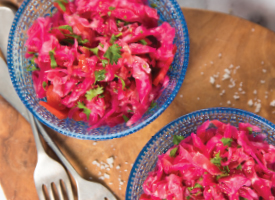Probiotics: get cultured!
by Nick Rose, M.S.
This article was originally published in May 2016

A healthy gut contains more than a trillion bacterial cells that assist digestion and are an integral part of our immunity. New research finds that these good bacteria also are important for regulating body weight, heart health, diabetes risk factors and even brain function.
While we know how important these good bacteria are for our health, we don’t yet know which specific strains of bacteria are the most beneficial. It makes sense that we should eat a wide variety of cultured/fermented foods every single day to nourish our microbiome and support our overall health.
Foods
Luckily there are more unique probiotic-rich foods coming out all the time. Here are some favorite new (and old) products to help you get cultured:
Firefly Kitchen kraut brines
These brines offer the same probiotic punch as raw sauerkraut and can be incorporated into sauces, marinades, dips and even cocktails. You also can start your day with a shot of tasty brine to get your daily dose of probiotics, electrolytes and vitamins.
Iggy’s Krauts
These locally made (Bainbridge Island) raw sauerkrauts incorporate wholesome superfoods. Try the Turmeric Kraut, the Kale Kraut, or the mineral-rich Sushi Kraut, made with sustainably harvested seaweeds.
Iggy’s Kvass
Beet kvass is an energizing veggie tonic combining the nutritional benefits of beets, ginger and live active cultures. This deep-red beverage can be enjoyed by itself or incorporated into healthy cocktails.
Blue Hill savory yogurts
Who says yogurt must be sweet? Blue Hill savory yogurts are made from organic, grass-fed whole milk. Very lightly sweetened and combined with savory flavors such as beet, sweet potato and carrots.
Live soda
A great choice for a “gateway kombucha” that can help you switch your daily soda habit to a healthful kombucha habit. These sodas contain 7 billion probiotic bacteria per bottle, combined with stevia and flavors such as Pure Doctor, Culture Cola and Dreamy Orange.
Soma kombucha +Jun
Jun tea is similar to kombucha, except it is made from green tea and honey, while kombucha is made from black tea and sugar. Soma kombucha + Jun provides more than 4 trillion probiotics per bottle by combining these fermented teas with other botanicals including coffee, ginger, pomegranate and rose.
White Mountain Bulgarian yogurt
This is the only yogurt in a glass jar and claims to provide 90 billion CFU per serving — quite a potent dose to support your microbiome.
Supplements
Nature’s Way primadophilus powder
Provides five strains of bacteria important for children’s health (as well as FOS, an important prebiotic) and easily can be added to smoothies, yogurt or applesauce.
Jarrow Formulas EPS
A great probiotic for travelling. It’s shelf-stable and packaged in blister-packaging to ensure high potency (8 strains/5 billion CFUs) during travel.
More about potency
The potency of probiotic supplements usually is reported in CFUs (colony forming units), an estimate of how many living/viable bacteria are present in each serving. There is currently no “Daily Value” for how many CFUs we need each day, but 1 billion/day is probably a good maintenance dose, and higher doses (50-100 billion) are helpful for repletion, or therapeutic doses. The potency of supplements is usually a guarantee of the probiotic content when the product expires, so the product will likely have a higher dosage before the expiration date.
Probiotic foods, on the other hand, can actually increase in potency, as the viable bacteria continue to multiply in the food the longer the food is stored/fermented. Fermented foods such as sauerkraut and kefir provide nutrients for the bacteria to thrive, unlike supplements where the bacteria are isolated in a capsule. More foods are starting to list the specific strains of probiotic bacteria, rather than simply listing “live cultures.” Some also are providing an estimate of the CFU content.
It’s equally important that we feed these good bacteria, once they’re living in our guts, by eating a variety of fiber-rich whole foods. Vegetables, fruits, beans and whole, intact grains provide the best combination of soluble fibers and antioxidants that encourage our gut bacteria to thrive and support our overall health.
Learn about probiotics in a Walk, Talk & Taste class at PCC stores in May. Sign up here.
